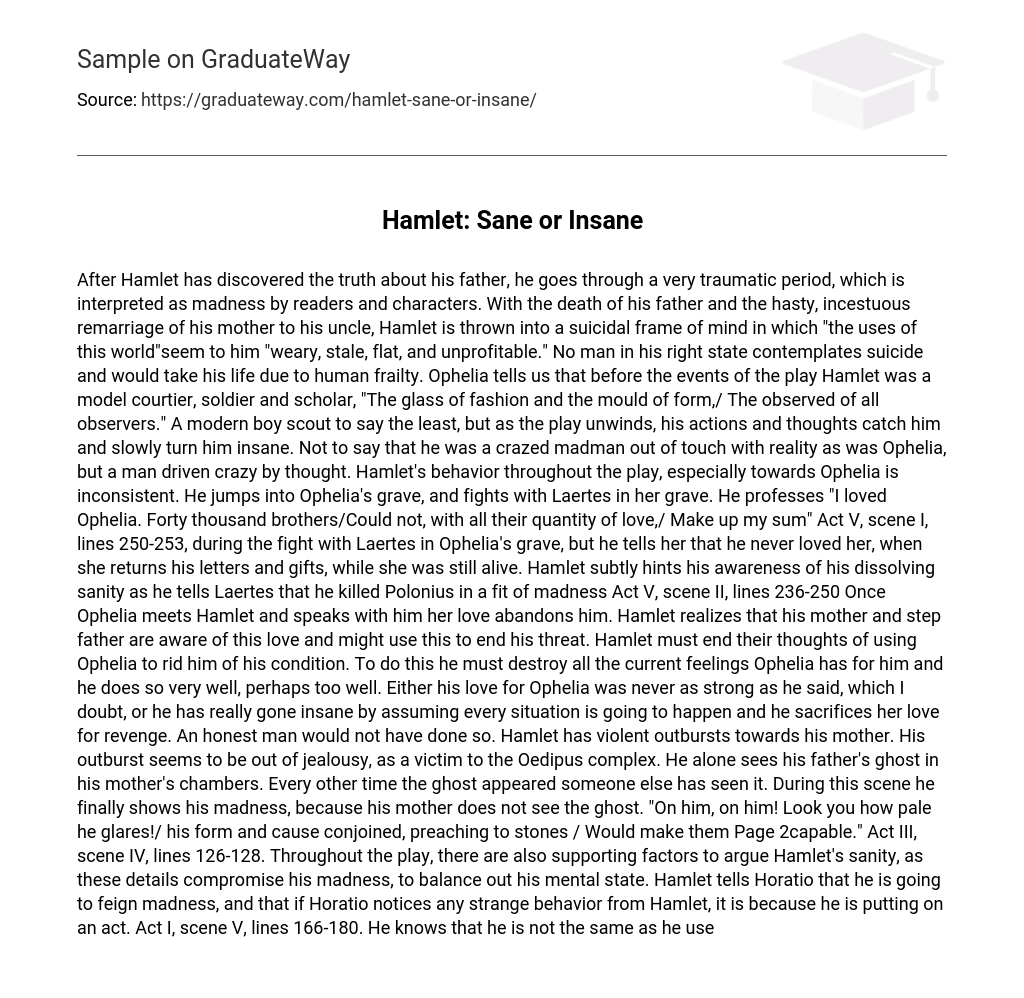After discovering the truth about his father, Hamlet undergoes a deeply distressing period, which is seen as madness by both readers and characters. This is caused by the death of his father and his mother’s rushed, incestuous remarriage to his uncle. As a result, Hamlet is overwhelmed with thoughts of suicide, viewing the world as tiresome, uninteresting, and unprofitable. It should be noted that a mentally stable individual would not consider suicide over human weaknesses. Ophelia reveals that prior to the events of the play, Hamlet was an exemplary courtier, soldier, and scholar – someone who was admired and observed by all.
In the play, Hamlet’s gradual descent into madness is driven by his own thoughts and actions, despite his initial portrayal as a virtuous person. Unlike Ophelia, who loses touch with reality, it is Hamlet’s behavior towards her that reveals his instability. He unexpectedly jumps into her grave and fights with Laertes there, all while expressing his love for Ophelia and claiming no other could compare. However, he contradicts himself by telling Ophelia that he never loved her when she returns his letters and gifts while still alive. By confessing to Laertes that he impulsively killed Polonius in a state of madness, Hamlet subtly indicates his declining sanity. As Ophelia confronts him and withdraws her affection, Hamlet fears that his mother and stepfather may exploit this situation to eliminate him as a threat.
Hamlet needs to stop using Ophelia to cure his condition. He successfully destroys Ophelia’s feelings for him, which may be too extreme. It is possible that his love for Ophelia was not as strong as he claimed, or he has become insane by expecting every scenario to occur and sacrificing her love for revenge. A sincere man would not have done this. Hamlet becomes violently angry towards his mother, possibly due to jealousy caused by the Oedipus complex. He is the only one who sees his father’s ghost in his mother’s room, while others have seen it on different occasions. His madness is finally evident during this scene because his mother cannot see the ghost. “On him, on him! Look at how pale he stares! His appearance and reason combined would persuade even inanimate objects.” (Act III, scene IV, lines 126-128). Throughout the play, there are also evidence supporting Hamlet’s sanity, as these details contradict his madness and balance out his mental state. Hamlet informs Horatio that he will pretend to be mad and if Horatio notices any strange behavior, it is simply an act (Act I, scene V, lines 166-180). He knows that he has changed and fears he is going insane, so by revealing to his closest friend that it is all an act, he covers his tracks.In this state of frustration, all he can do is express his discontent through bitter satire and then succumb to feelings of sadness that lead to thoughts of suicide.
Throughout the play, Hamlet experiences frequent mood swings. When he learns of his father’s murder, Hamlet behaves erratically, uttering confused and tumultuous words such as “Why, right; you are I’ the right; And so, without more circumstance at all, I hold it fit that we shake hands and part” (Act I, scene V, lines 127-134). Furthermore, after Hamlet kills Polonius, he refuses to disclose the whereabouts of the body and instead adopts a sarcastic tone: “Not where he eats, but where he is eaten. / A certain convocation of political worms a e’en at him” (Act IV, scene III, lines 20-21). In the two months following his encounter with the ghost, Hamlet confounds the court with his feigned madness but takes no concrete action towards exacting his revenge. The fact that he is unable to embrace the beauty of life or eradicate its evils now troubles him as much as his outward hysterics. Act IV, scene II portrays Hamlet seeming insane after Polonius’s death.
Despite being a genius, Hamlet possessed deep thoughts and strategic plans. He had the ability to foresee others’ actions before they were aware of them. However, his inclination to delay and desire for revenge eventually overwhelmed him. The complex plots and situations he encountered became so twisted that he had to sacrifice his sanity. It was only then that he truly descended into madness and lost control over the elaborate web he had created. Whether his madness was genuine or pretended, Hamlet willingly embraced his role as a deranged individual, allowing himself to be consumed by his own deeds.





